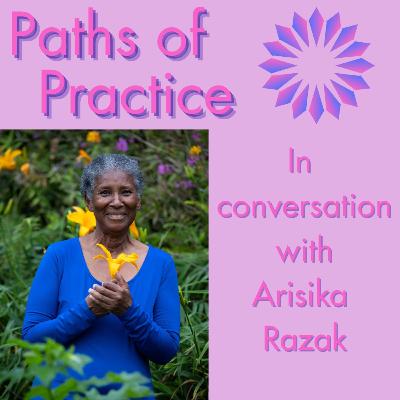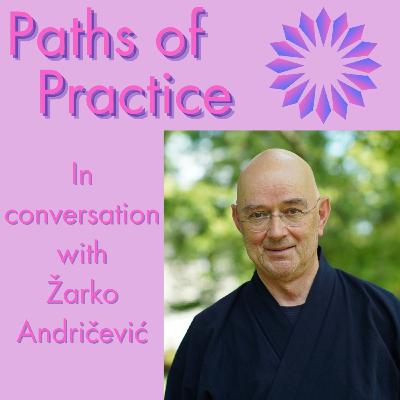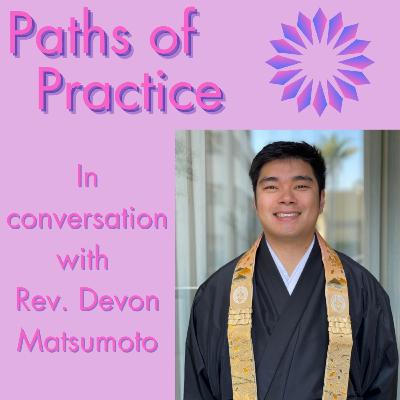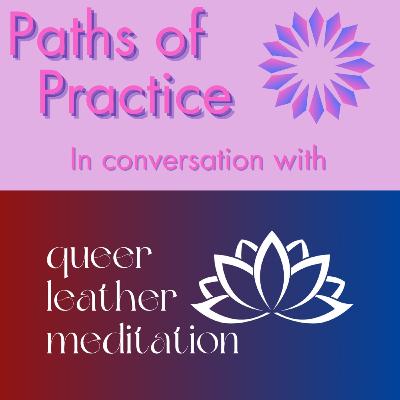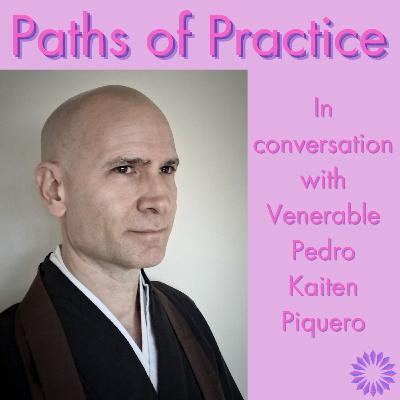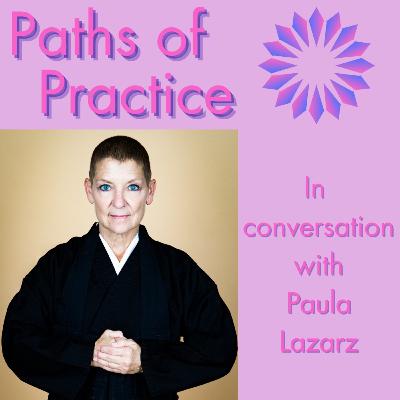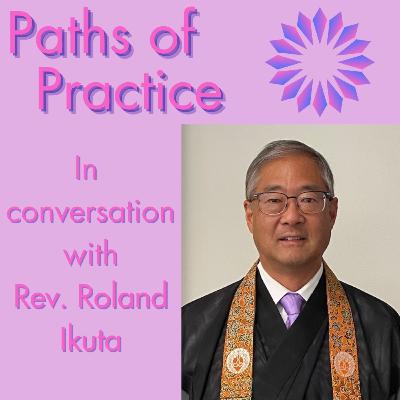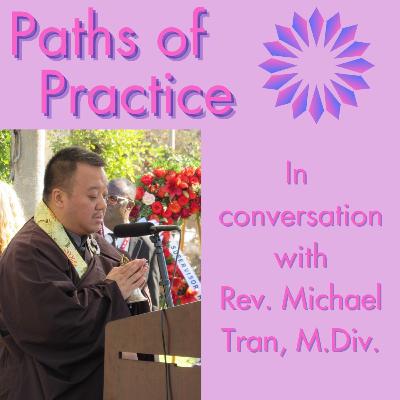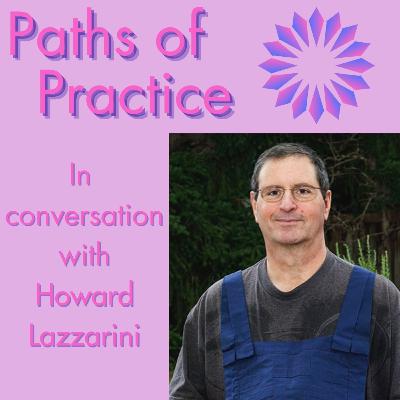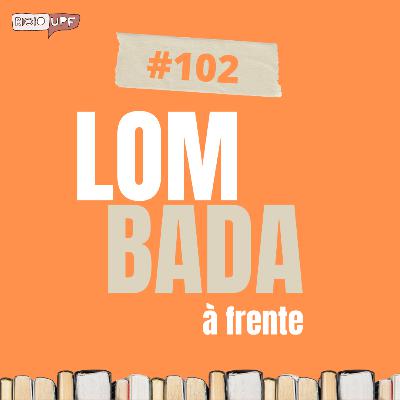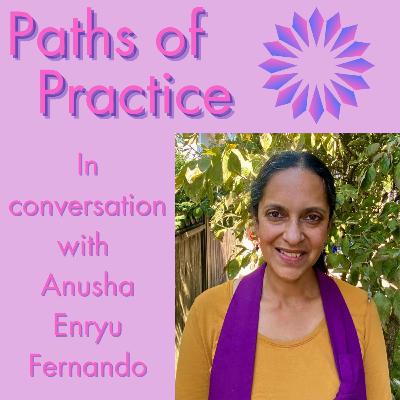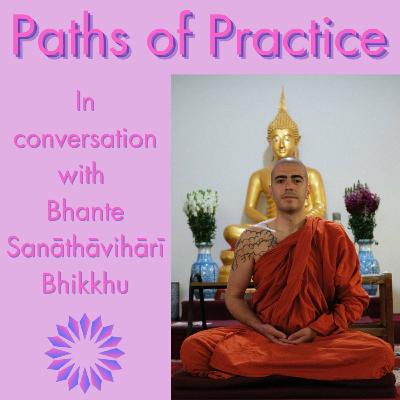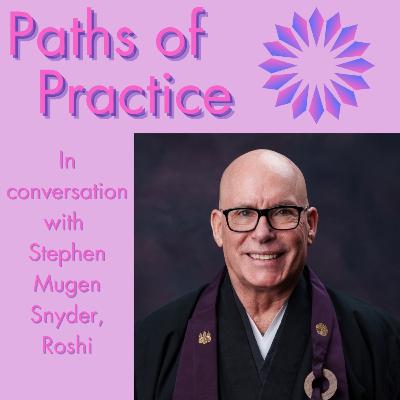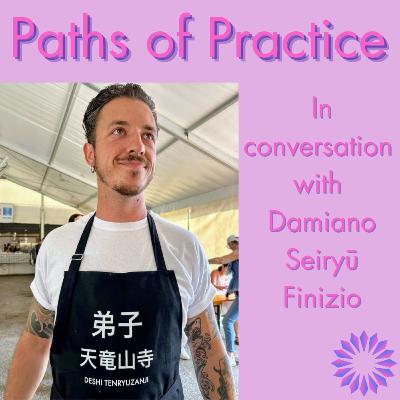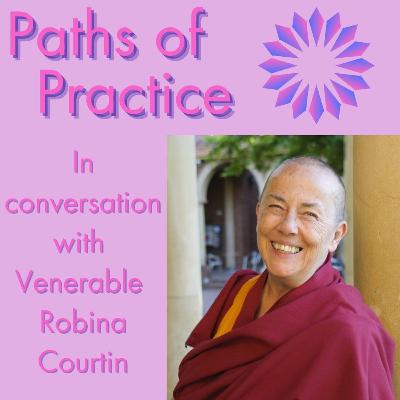Discover Paths of Practice: Conversations on Journeys into Buddhism
Paths of Practice: Conversations on Journeys into Buddhism

Paths of Practice: Conversations on Journeys into Buddhism
Author: Vincent Moore
Subscribed: 12Played: 130Subscribe
Share
© Vincent Moore
Description
Paths of Practice (PoP) is a podcast that features interviews with people sharing their experiences with Buddhism and Buddhist practice.
The podcast includes conversations with folks from a wide variety of backgrounds, both those that have been on the path for a while and those just starting out as well as everyone in between. In a way, the podcast sets out to explore the "84,000 paths to enlightenment," one Buddhist at a time.
PoP was created and is hosted by Vincent Moore. Vincent is a relatively new practitioner of Soto Zen and has an MA from the Institute of Buddhist Studies.
The podcast includes conversations with folks from a wide variety of backgrounds, both those that have been on the path for a while and those just starting out as well as everyone in between. In a way, the podcast sets out to explore the "84,000 paths to enlightenment," one Buddhist at a time.
PoP was created and is hosted by Vincent Moore. Vincent is a relatively new practitioner of Soto Zen and has an MA from the Institute of Buddhist Studies.
107 Episodes
Reverse
Brook Ziporyn is a scholar of ancient and medieval Chinese religion and philosophy at The University of Chicago Divinity School and College. Professor Ziporyn received his BA in East Asian Languages and Civilizations from the University of Chicago, and his PhD from the University of Michigan. Prior to joining the Divinity School faculty, he has taught Chinese philosophy and religion at the University of Michigan (Department of East Asian Literature and Cultures), Northwestern University (Department of Religion and Department of Philosophy), Harvard University (Department of East Asian Literature and Civilization) and the National University of Singapore (Department of Philosophy). He is the author and translator of several books including his latest work, Experiments in Mystical Atheism: Godless Epiphanies from Daoism to Spinoza and Beyond, which was published by the University of Chicago Press in October of 2024. (A longer list of Ziporyn's work can be found towards the end of this description.)Please see below for the link to the Stanford Encyclopedia of Philosophy article mentioned in this podcast episode here:https://plato.stanford.edu/entries/buddhism-tiantai/Please also see below for links to Ziporyn's book, Experiments in Mystical Atheism: Godless Epiphanies from Daoism to Spinoza and Beyond, as well as its online appendix (free):https://press.uchicago.edu/ucp/books/book/chicago/E/bo230169826.htmlhttps://press.uchicago.edu/sites/ziporyn/index.htmlWe discussed walking the mandalas of sacred Buddhist sites, approaching Buddhism as both a scholar and practitioner, Tiantai meditation techniques and broken teapots, Dogen and the connections between Tendai and Soto Zen, and the importance of finding the Buddhist path that best suits you.Ziporyn is also the author of:-Evil And/Or/As the Good: Omnicentric Holism, Intersubjectivity and Value Paradox in Tiantai Buddhist Thought (Brill, 2000)-The Penumbra Unbound: The Neo-Taoist Philosophy of Guo Xiang (SUNY Press, 2003)-Being and Ambiguity: Philosophical Experiments With Tiantai Buddhism (Open Court, 2004)-Zhuangzi: The Essential Writings with Selections from Traditional Commentaries (Hackett, 2009)-Ironies of Oneness and Difference: Coherence in Early Chinese Thought; Prolegomena to the Study of Li (SUNY Press, 2012)-Beyond Oneness and Difference: Li and Coherence in Chinese Buddhist Thought and its Antecedents (SUNY Press, 2013)-Emptiness and Omnipresence: An Essential Introduction to Tiantai Buddhism (Indiana University Press, 2016)-Zhuangzi: The Complete Writings (Translator, Hackett 2020)-Daodejing (Translator, Liveright Books and the Norton Library 2022)
Arisika Razak is Professor Emerita at the California Institute of Integral Studies in San Francisco, where she also served as the director of the Women’s Spirituality MA and PhD program and as Director of Diversity. She has been an inner-city midwife for over two decades, has performed nationally and internationally as a spiritual dancer, and has led embodied healing workshops for over thirty-five years. She teaches at East Bay Meditation Center in Oakland.Please see below for Arisika's upcoming and ongoing events as well as recommended resources:Afrikan Healing and Wisdom With Vimalasara Mason-John, Arisika Razak, and Aleta Toure’ First Sundays at East Bay Meditation Center (online)https://eastbaymeditation.org/calendar/online-afrikan-wisdom-and-healing-2-2-2/Honoring the Past, Revisioning the Future: Afrikan Healing & Wisdom Taught by Vimalasara, Arisika Razak, and Aleta Toure’In-person, Residential Retreat: February 5 - 8, 2026https://www.dhammadena.org/retreats/Afrikan-Wisdom-Retreat-Feb-2026Middle East Children’s Alliancehttps://www.mecaforpeace.org/Crushing Wheelchairs (Film)https://wraphome.org/2025/11/03/crushing-wheelchairs-premiere-of-the-movie-in-the-sf-bay-area/We discussed civil rights activism and growing up listening to Malcolm X in Harlem, midwifery and identifying connections between breath techniques used during labor and meditation, karma and the caste system, kinship and learning how to recognize those that are different than us as meaningful and integral to our shared sacred hoop, and the importance of remembering to trust that you have a life purpose and that you have your own path of heart.
Žarko Andričević is the founder of Dharmaloka Chan Buddhist Community and Chan Retreat Centre (Chan centar Hartovski vrh) in Croatia, where he currently lives and teaches. Žarko first encountered Buddhism 1975 and has been a martial arts and yoga teacher since the 1970s. In the mid-80s, he started the first Buddhist study and meditation group in Croatia. In 1996, he meet Chan Master Sheng Yen and became one of his students. Žarko received Dharma transmission from Master Sheng Yen in June 2001. Since then, he teaches and leads Chan retreats in Europe, USA, Canada, Taiwan and Australia.For more information about Žarko and Chan centar Hartovski vrh, please visit the following link:https://chan.hr/en/chan-retreat-center-croatia/We talked about martial arts and forming Croatia's first Buddhist practice group, Master Sheng Yen and silent illumination practice, Zenyoga and awakening your body through physical movement, and the importance of remembering to approach dharma with a joyful seriousness.
American Buddhist Fellowship (ABF) disciples Keith and Sissi share what they have learned from Venerable Xingren since volunteering at the temple, their Buddhist journeys, the upcoming Consecration Ceremony that ABF will host on December 25, 2025, and the teachings Venerable Xingren plans to resume after the New Year. For more information about the American Buddhist Fellowship, please visit the following website: https://www.meifo.org/Speakers introduction:At 19 years old, Keith came from China to the United States and first encountered Buddhism through Master Chin-Kung’s Pure Land teachings. For 17 years his main practice has remained reciting Amitabha Buddha’s name and aspiring for rebirth in the Western Pure Land, even as he later studied other masters and methods. During his years in the U.S., Keith has lived in several cities, completing his studies and then working for over ten years. In July this year, Keith met Venerable Xingren through Dharma Sister Shen Yun, whom he had long admired for overcoming late-stage, metastasized cancer through unwavering recitation of Amitabha Buddha’s name. Sister Shen introduced Keith to the American Buddhist Fellowship and invited him to support its multimedia work. Since joining as a volunteer, Keith has built the temple’s website, secured Google Workspace for Nonprofits, and helped produce more than ten related videos.Sissi has been studying Buddhism for 3 years and practicing Pure Land Buddhism for about 1.5 years. After learning that the American Buddhist Fellowship was raising funds to build and renovate its new temple in Covina, CA—and with the introduction from Dharma Sister Shen Yun—Sissi began volunteering in July 2025. Since then, she has humbly assisted with the shipping and customs clearance of the Buddha statues for the new temple, YouTube video editing, website development, and other projects assigned by Venerable Xingren of American Buddhist Fellowship.We discussed the American Buddhist Fellowship and how community members connect digitally, aspirations and how ambitious vows can manifest, Pure Land Buddhist practice and the potential impact of reciting Amitabha’s name, and ABF's upcoming Consecration Ceremony.
Rev. Devon Matsumoto is a Minister’s Assistant at the Mountain View Buddhist Temple. Devon grew up in the Jodo Shinshu community and has a deep interest in understanding how his Buddhist teachings can inform social justice movements and movements toward liberation. Devon is also a founding member of The Young Buddhist Editorial, an organization that seeks to share the stories of young Asian American Buddhists while preserving the experiences and stories of their ancestors. Please see the following links for more information about organizations and efforts that Devon works with:Raffle Fundraiser for Mona Alshourafa & Familytinyurl.com/raffle-for-monaMountain View Buddhist Templehttps://mvbuddhisttemple.org/The Young Buddhist Editorialhttps://www.youngbuddhisteditorial.com/We talked about moving to Japan for Kaikyoshi certification and the benefits of studying Jodo Shinshu in Japanese, social justice advocacy and recognizing 'the cries of the nembutsu' as a wake up call, Buddhist youth groups and understanding that children aren’t just the future but are part of the present, and the importance of remembering that you're never alone where you're walking the Buddhist path.
The Queer Leather Meditation group is a peer-led meditation group for those who have a meditation practice and are queer and leather/kink-identified. QLM's intention is to create an inclusive space where participants can support each other as they practice in their daily lives. The group meditates together and also offers a time for check-ins with individual meditation practices. This group provides an accepting space where folks can include the queer and leather/kinky parts of their identities and experiences when talking about their practices.This episode features a conversation with Ro Rose and Kota Rook, who are members of the Queer Leather Meditation group.For more information about Queer Leather Meditation, please visit their Instagram account: @queerleathermeditationPlease also see below for account information for Ro Rose and Kota Rook:Ro Rose @queerlyfluid Kota Rook @soulskin.bodyworkWe talked about scar care and the joy of attending to healing, BDSM and stillness, the power of place and identifying similarities among dungeons and temples, the Queer Leather Meditation group and the value of meeting in a peer-led space, and the importance of remembering that we all have different access points and that all rivers lead to the sea.
Pedro Kaiten Piquero was born in 1976, exactly 38 years before the death of his master Gudo Wafu Nishijima, of whom he was the last disciple. In 2017, he received Dharma transmission in Japan from Venerable Peter Rodo Rocca in the lineage of Nishijima Roshi. He is president of the Dogen Sangha in Spain and director of the Zendo Gudo, as well as an active member and guest lecturer of the Dharma Voices for Animals organization.For more information about Venerable Kaiten and the above organizations, please see the following links:Zendo Gudohttps://zendogudo.es/Dharma Voices for Animalshttps://www.dharmavoicesforanimals.org/We discussed perfectionism and classical piano, animal rights and having compassion for the bull and the bullfighter, impermanence and the relief in knowing that you'll be forgotten in 100 years, and the importance of taking your time.
Rev. Shudo Paula Lazarz is a 6th degree Black Sash in Shaolin Kung Fu and an ordained priest in the Soto Zen lineage of Shunryu Suzuki. Her over two decades of study in the martial arts and Buddhist practice has been an exploration of the idea of the historical Shaolin Temple, culminating in Warrior’s Path Buddhist Academy. Paula is a co-owner of Energy Fitness, Inc., Head Instructor at HealthKick Kung Fu and a Practice Leader at Ancient Dragon Zen Gate.For more information about Paula and the above organizations, please see the following links:Ancient Dragon Zen Gatehttps://www.ancientdragon.orgWarrior's Path Buddhist Academy https://warriorspathacademy.orgHealthKick Kung Fu https://healthkickkungfu.comWe discussed how practicing martial arts in tandem with Chan/Zen peels back the onion layers of our humanity and reveals our true nature, feeling a sense of homecoming while visiting Shaolin Temple as well as Green Dragon Temple/Green Gulch Farm, lay ordination and female representation in sangha leadership, and the importance of remembering that difficulty is part of the training.
Mindy Newman, MA, MTS, LMHC, is a psychotherapist and hypnotherapist in private practice. She has an MA in counseling psychology from Lesley University and an MTS in world religion from Harvard University. She is a graduate of Nalanda Institute’s Contemplative Psychotherapy Program and taught meditation as part of the institute’s Introduction to Meditation series at Tibet House. Newman was recently one of Tricycle’s online dharma talk leaders and has written several pieces for Tricycle as a contributor. She is a student of Geshe Tenzin Zopa, whom Mindy met on pilgrimage in Nepal in 2018.For more information about Mindy and her work with Tricycle, please see the following links:https://www.mindynewman.com/https://tricycle.org/author/mindy-newman/Please also see the following link for Geshe Tenzin Zopa's website: http://www.tenzinzopa.com/We talked about preparing for a pilgrimage to Bhutan and how sharing reflections with others can strengthen the pilgrimage experience, Geshe Tenzin Zopa and being drawn towards Vajrayana practice, grief and exploring Māyādevī through both inner and outer journeys, and the importance of remembering that the Buddhist journey can be messy.
Roland sensei was born in Richmond B.C. He attended the Steveston Buddhist temple and the Calgary Buddhist temple when his family moved there in the 1970’s. He is a retired physician who worked in senior’s care (Geriatric Medicine). While an active temple member all his life he started studying Buddhism more seriously in 2016. He received his first level ordination (Tokudo) in Japan in 2019 and his second level ordination (Kyoshi) in 2022. Besides his temple life he enjoys golf in the summer and is trying to learn the Taiko. He is married to Brenda and has two adult children.For more information about the Buddhist Temple of Southern Alberta (BTSA), please check out the following link: https://www.thebtsa.com/We discussed internment and the Japanese Canadian diaspora, the development of the BTSA as an amalgamation of other temples in the region, growing up in a temple family and asking for ministerial advice from his younger brother, geriatric medicine and transitioning from a career as a physician to becoming a minister, temple outreach and the impact that an enthusiastic young adult temple group has had on community building, and the importance of taking that step of trying out something new that interests you.
Rev. Michael Tran is an ordained Buddhist minister with over 30 years of Buddhist study and practice, and more than a decade of experience in spiritual care. His training includes lineages in Chinese Ch’an (Japanese Zen), Pure Land, and Tibetan Nyingma traditions, which inform his compassionate and inter-traditional approach to service. He holds a B.A. in East Asian Cultures from UC Irvine and an M.Div. in Buddhist Chaplaincy from University of the West, and completed Clinical Pastoral Education at USC Arcadia Hospital. Rev. Tran is ordained through the International Order of Buddhist Ministers and currently serves as a hospice chaplain, bereavement coordinator, and spiritual counselor. He is a board member and Chief Operations Officer of the Bodhiyana Buddhist Chaplain Fellowship and serves on the ritual teams of Kuang Min Buddhist Association in La Puente and Quan Yum Temple in Los Angeles Chinatown. His work centers on healing, presence, and service across communities. For Rev. Michael's blog (The Buddha Wears Glasses), please check out the following link: www.sgvbuddhism.wordpress.com For more information about the Bodhiyana Buddhist Chaplain Fellowship, please check out the following link: www.bbcf84000.org We talked about Buddhism in the San Gabriel Valley and “3-in-1 Combo” temples, chaplaincy and applying Pure Land teachings to hospice care clients and meeting their needs, recognizing ancestors as temple tenants and protectors through their lotus seats, The Buddha Wears Glasses blog and highlighting the nuanced Buddhist experience, and the importance of sangha, exploring, and the benefits of engaging with monastics.
Rev. Tony Truong serves as Secretary of the Board of Directors and Temple Minister at Ming Ya Buddhist Foundation in Los Angeles, where he supports the community’s liturgical life and daily operations. Ordained as a Lay Minister in 2018 through the International Center for Chinese Buddhist Culture and Education, his path has been shaped by his family’s deep ties to Chinese Buddhist Chan and Pure Land practice, as well as his own training in Shingon Vajrayana.He studied and practiced at Mount Koya in Japan and later continued his formation at Gokoku-ji Temple in Tokyo, under the Buzan-ha sect of Shingon Buddhism, with which Ming Ya has long maintained a spiritual partnership. Alongside his temple service, he is active in developing English-language liturgical resources to help make practice more accessible within Chinese American communities.A second-generation Chinese-Vietnamese American of Teochew descent, Rev. Truong was born in Minnesota, raised in the San Gabriel Valley, and teaches high school English in the region. To learn more about his community and work, visit the temple’s Instagram: @mingyabf.la.We discussed Rev. Truong's early experiences with Buddhism while attending his father’s memorial service and the impact of hearing chanting in the Teochew dialect, curiosity and being drawn to Buddhist symbolism and Ming Ya’s “gold room,” becoming a part of temple leadership and working towards bringing more people into the sangha, Ming Ya’s roots in Vietnamese Daoism and its connections to Shingon, and the importance of remembering that Buddhism is not just philosophy but also experienced through community.
Howard Lazzarini holds a degree in Japanese Language and Literature from the University of California at Berkeley. He spent 12 years in Japan and for several years during that time, in the early 1970s, practiced Soto Zen at Antaiji, a small temple that was located in the north Takagamine section of Kyoto. There he met his first teacher, Kosho Uchiyama Roshi and sat in the shikantaza style of Uchiyama Roshi and Dogen. After returning to the US he began studying with Shohaku Okumura Roshi of Sanshin Zen Community in Bloomington, Indiana, where he took lay ordination. He translated The Sound that Perceives the World in close collaboration with Okumura Roshi and Shoko Hayashi Lazzarini, his wife. He currently lives in Everett, Washington, and practices with the Everett Zazen Group located in Everett.Please see below for more information about his upcoming translation, The Sound That Perceives the World: Calling Out to the Bodhisattva by Kosho Uchiyama, as well as the Everett Zazen Group:https://www.simonandschuster.com/books/The-Sound-That-Perceives-the-World/Kosho-Uchiyama/9781614299516https://everettzazengroup.org/We discussed growing up in the San Francisco Bay Area in the 1960s and becoming a merchant mariner, finding Antaiji while hitchhiking in Japan and his early experiences with Zen, Kosho Uchiyama Roshi’s life and relationship with the Kannon-gyo, reconnecting with Shohaku Okumura Roshi in the US and starting the Everett Zazen Group in Washington state, and the importance of letting go of likes and dislikes and "opening the hand of thought."
Primož Korelc Hiriko was born in 1985 in Ljubljana (Slovenia), but grew up in Dolenjska. Hiriko spent many years as a Buddhist monk abroad, specifically in Great Britain, New Zealand, Thailand and Sri Lanka. During this period, Hiriko studied Buddhist psychology and developed self-reflection, which gave Hiriko a deeper insight into the mind and psyche. Hiriko's expertise focuses mainly on phenomenological research into the structure of the mind. After ten years of studying Buddhist philosophy and psychology, Hiriko obtained the title of acharya . In 2016, Hiriko founded the first Slovenian Buddhist monastery, Samaṇadīpa, in Goljek near Trebnje, where Hiriko was the abbot and teacher until 2023. Since then, Hiriko has been acting as its legal representative. Hiriko is also known for being the editor-in-chief of Path Press and the author of two biographical books, “The Hermit of Bundala” and “The Island Within”, as well as being a translator of ancient Buddhist texts. Hiriko is still actively working as a psychosocial and pastoral counselor and has specialized in logotherapy psychotherapy since last year. Hiriko also regularly leads meditation retreats and lectures on meditation in Maribor and Ljubljana.For more information about Hiriko and the Samaṇadīpa Forest Buddhist Monastery, please see below:https://hiriko.org/https://samanadipa.org/sl/For a link to Nyanamoli Thero's work that Hiriko mentioned, please see below:https://www.youtube.com/@HillsideHermitageWe talked about guilt as a consequence of freedom and as inherent within the broader human experience, psychotherapy and spirituality, the experience of leaving home to pursue a monastic life and investigating the mind, founding Samaṇadīpa Forest Buddhist Monastery in Slovenia and transitioning to lay life, and the importance of knowing that the Buddhist path, though fulfilling, is not always easy.
Peace Twesigye is a musician, meditation teacher and mentor, teacher of BuddhaDharma, and leadership consultant who hopes to be a part of the changes that unbind each of us from the systems that limit our momentum toward expressions of joy, love, loss, compassion, and creativity. Peace is the former Director of Programming in Buddhist Studies and of the Thích Nhất Hạnh Program for Engaged Buddhism at Union Theological Seminary. Peace is currently on the board of Lion’s Roar Foundation, and is participating in the Insight Meditation Society and Spirit Rock retreat teacher training program from 2025-2028. For more information, please check out Peace's website: https://www.peacetwesigye.com/We discussed developing and practicing within a self-retreat container, connecting and identifying with Thích Nhất Hạnh and his positionality as a political refugee, chamber music and surrendering to something larger than yourself, Engaged Buddhism and practicing for life, and the importance of acknowledging your connections with spiritual friends.
Anusha Enryu Fernando was born in Sri Lanka to a Theravadin Buddhist family. Her grandparents founded the Vipassana Meditation Centre located in Colombo, Sri Lanka in 1957. She began practicing Zen Meditation with Hogen and Chozen Roshi in 2007, and became a dharma holder in 2021. She holds a BA in Religious Studies, specializing in Buddhism and Hinduism from McGill University, and a Masters of Arts in Asian Studies from the University of British Columbia, specializing in Sanskrit. In her dissertation, she translated a Sanskrit poem of the life story of the Buddha, called the Padyacudamani. Enryu has been a teacher and performer of Bharata Natyam, a form of Indian Classical Dance, for the past thirty years and is the founder and Artistic Director of Shakti Dance Society. She has also been the book purchaser at Banyen Books and Sound, Vancouver’s iconic spiritual and metaphysical bookstore, for the past twenty-eight years. She is the mother of an adult daughter and lives with her husband, parents, and multiple furry friends in Vancouver, Canada.For more information about the Zen Community of Oregon and the Shakti Dance Society, please see the below links:https://zendust.org/http://www.shaktidancesociety.com/anusha-fernando/We talked about the connections between Bharata Natyam and zazen, generosity as an expression of practice, learning Sanskrit and translating the Padyacudamani, Jizo Bodhisattva and the Jizo Garden at Great Vow Zen Monastery, the creative and meaningful challenges of cooking and eating what is given during sesshin, and the importance of remembering the joy of practice.
Bhante Sanāthāvihārī is a Mexican-American Theravāda monk at the Sarathchandra Buddhist Center in North Hollywood, a Sri Lankan center. He is a student of the late Dr. Bhante Madawela Puññaji, and the founder of Casa De Bhavana–an outreach project to bring the Dhamma to the Spanish-speaking world. He is also the co-author of Buddhism in 10 Steps.For more information about Sanāthāvihārī Bhikkhu and Casa De Bhavana, please see the below links:https://sanathavihari.com/https://casadebhavana.com/We talked about personal expression and creativity while still operating within the Vinaya, serving in the Air Force and co-founding a Buddhist sangha while on base in Afghanistan, Casa de Bhavana and balancing pre-sectarian and non-sectarian Buddhist teachings, and the importance of believing in yourself (and if you can’t do that, knowing that the Buddha believes in you).
Stephen Mugen Snyder, Roshi began practicing daily meditation in 1976. Since then, he has studied Buddhism extensively—investigating and engaging in Zen, Tibetan, Theravada, and Western non-dual traditions. He was authorized to teach in the Theravada Buddhist tradition in 2007 and the Zen Buddhist schools of Soto and Rinzai in 2022. Mugen is a senior student of Roshi Mark Sando Mininberg and a transmitted teacher in the White Plum Asanga—the body of teachers in the Maezumi-roshi lineage.Mugen’s resonant and warmhearted teaching style engages students around the globe through in-person and online retreats, as well as one-on-one coaching. He encourages students to turn toward their true nature and, with realization of their true nature, embody their true identity. Mugen is the author of five books, including Liberating the Self, Demystifying Awakening, and Buddha’s Heart. He co-authored Practicing the Jhānas.For more information about Awakening Dharma, please visit the following link: https://awakeningdharma.org/For Todd Mushin Lisonbee's interview with Mugen Roshi, please see the following link: https://youtu.be/pscxTP2ckeE?si=bgvZ9n1pyKCpcZbeWe discussed Inka Shomei and the sacred and humbling experience of sharing a dharma eye with a teacher, koan study and working with our bull tails that are sticking out, the Enneagram and being your uniqueness without being your dysfunction, how deeper levels of awakening reveals deeper levels of work that needs to be done, and the importance of making contact with your innate goodness.
Damiano Finizio was born in Italy in 1992. He began practicing traditional Japanese martial arts in 2012, where he met the Buddhist monk Seiun, who transformed his curiosity for Eastern disciplines and philosophies into dedicated practice. In 2014, he officially took refuge in the Dharma at Tenryuzanji Temple, receiving the name Seiryu, symbolizing his deep bond with his teacher and the temple. Since 2020, he has been living and working in Spain as a hostel owner, while also working seasonally in Italy and Croatia as a trip leader during the warmer months. Despite his commitments, he remains an active member of the Tenryuzanji community and continues to participate in its activities whenever possible.For more information about Tenryuzanji Temple, please see the following link: https://www.tenryuzanji.org/We talked about finding Buddhism through martial arts and how martial arts training cultivates self-development, foraging for local weeds and keeping a vegan diet at the temple, Tenryuzanji Temple's status as Italy’s only Tendai temple and its warm relationship with the nearby mountain village (Cinte Tesino), how Buddhist practice brings out your inherent compassionate energy, and the importance of finding a teacher and not giving up!
Ordained since the late 1970s, Ven. Robina has worked full time since then for Lama Thubten Yeshe and Lama Zopa Rinpoche’s Foundation for the Preservation of the Mahayana Tradition (FPMT). Over the years she has served as editorial director of Wisdom Publications, editor of Mandala Magazine, executive director of Liberation Prison Project, and as a touring teacher of Buddhism. Her life and work with prisoners have been featured in the documentary films Chasing Buddha and Key to Freedom.Here's a link to Chasing Buddha, which is mentioned throughout the episode:https://youtu.be/B3Xx4vSHUyY?si=URaiHqlIAD_G_NSPWe talked about opinions and the impact of negative thoughts, prison chaplaincy and the doors that open when you adjust your attitude, activism and changing the world by exploring your self, the need to abstain in order to perceive the nature of your attachments, and the importance of recognizing your enormous potential.



